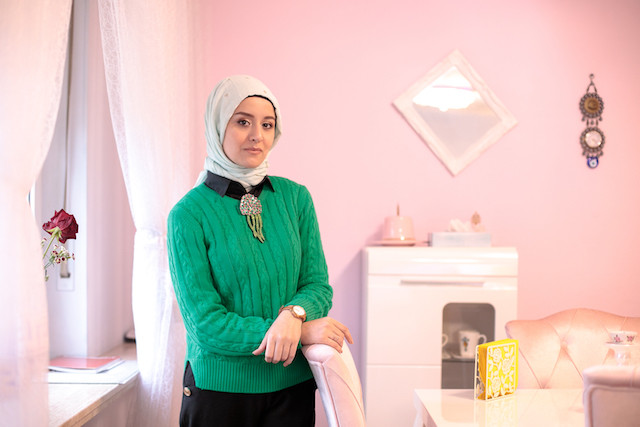Ranya answers the phone in flawless French. She is expecting my call and though I know she spoke English fluently before coming to Luxembourg, today French comes to her more easily. “I am now in the right place thanks to my French teacher, Adrien Bedin,” she tells me. “He taught me French step by step. He had a lot of patience with my linguistic mistakes. His passion to teach the language motivated me a lot.”
Ranya was born in Iraq, in Bagdhad, where her mother was a maths teacher and her father a lawyer. The three, along with her brother and sister, fled to Syria in 2004, shortly after the US-led invasion that toppled the government of Saddam Hussein, triggering a decade-long civil conflict. They returned to Iraq in 2012 but struggled to settle and, two years later, moved to Turkey. Ranya was 20 by the time they came to Luxembourg in 2016 and applied for international protection.
Five years on and Ranya does not wish to dwell on that time, preferring to live in the present. Looking back, she says: “I see a person who encountered many difficulties in getting what they wanted.” She says having the love of her family helped her through much of this time. Today, Ranya’s parents are mastering Luxembourgish and she is pursuing university studies in psychology and social work in Belgium. “It was not easy, but with a little perseverance, patience and sacrifice, you can achieve your goals.”
1.3 million displaced people in 2015
A year before Ranya’s arrival in Luxembourg, a record 1.3 million migrants came to Europe to apply for asylum. This was nearly double the 700,000 recorded in 1992 following the fall of the Iron Curtain, according to the Pew Research Center. Men made up 73% of that group. Among them was Zain*, whom I first met in 2016. Aged 30 at the time of leaving, he was faced with the choice of forced conscription or fleeing. Not wishing to subject his wife and three young daughters to the journey, he travelled alone, expecting to bring them over once he had secured asylum. “The journey was horrible, unsafe, it was crazy,” he recalls.

Ranya is pictured with her parents. Photo: Matic Zorman
Six years since arriving, the transformation is striking. Zain’s family has joined him and his children speak Luxembourgish fluently. He works as a bus driver and his wife recently gave birth to their son. The key, he said, was living with a kind and generous host family, unlike the majority of asylum seekers, who live in dedicated housing, known as foyers. Zain’s host family was arranged for him via a volunteer support network before he arrived. In 2015, just 70 asylum seekers benefited from such arrangements.
“I lived with them for several years and they are like my parents. I will never forget them. I will look after them when they need it,” Zain says. With their support and contacts, Zain became a volunteer firefighter, joined a church and then later secured temporary housing in the commune of his host family.
Like Ranya, Zain doesn’t like to dwell on the past, on what he and his wife lost and the reason why there are no photos of his parents at home. But the fact that he wishes not to be identified shows how hard it is to escape that past--since anything he says risks endangering the family still living in Syria.
85% capacity
While Ranya and Zain’s cases show it is possible to start over, not all displaced people are so fortunate. Luxembourg’s foreign affairs minister recently reported that the foyers are at 85% capacity, despite the number of people applying for international protection tailing off. The foyers are occupied by many people who have asylum status but are unable to secure housing because they don’t have the financial means or work. Sérgio Ferreira, spokesperson for the foreign workers rights organisation Asti, blames the fact that skills training and empowerment of displaced people starts only once a migrant is granted international protection, a process that in rare cases can take up to four years.
He says that civil society initiatives like families hosting refugees show that “the more actively we work on integration in administration and empowerment for these people, the better the results are.”
